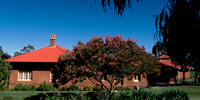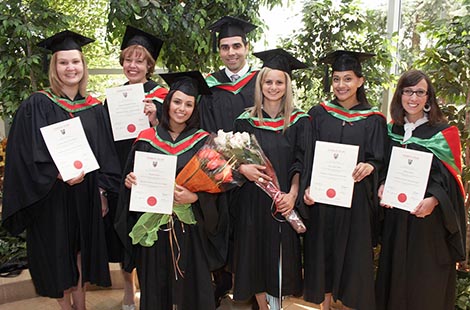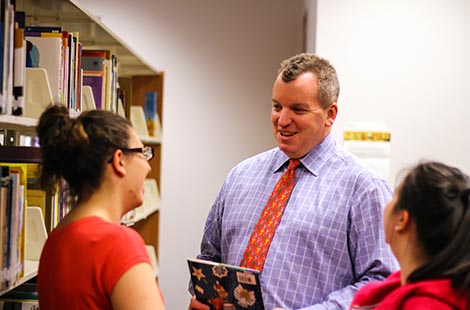Campus histories
The architecture of Charles Sturt University campuses reflect our history and our future. We are part of our local communities and we offer a diverse range of campus environments and experiences.
-
Albury-Wodonga chevron_right
 In 1972, shortly after the establishment of the Riverina College of Advanced Education (RCAE), a study centre was set up in Albury as part of an ambitious distance education program. The Albury study centre was replaced in 1976 by the Albury-Wodonga study centre, and in 1984 the study centre was officially recognised as the 'Murray' campus of the RCAE.
In 1972, shortly after the establishment of the Riverina College of Advanced Education (RCAE), a study centre was set up in Albury as part of an ambitious distance education program. The Albury study centre was replaced in 1976 by the Albury-Wodonga study centre, and in 1984 the study centre was officially recognised as the 'Murray' campus of the RCAE.Effective from the 1 March 1985, the college's name was changed to the Riverina-Murray Institute of Higher Education (RMIHE) to better reflect the geographical areas serviced by the institution.
In 1989, the Charles Sturt University Act brought together the Riverina Murray Institute of Higher Education and the Mitchell College of Advanced Education to form Charles Sturt University. The Albury-Wodonga campus became one of the three foundation campuses of Charles Sturt University, along with Bathurst and Wagga Wagga .
The University purchased the historic local site in central Albury known as 'The Cedars' in 1990, to be used as the administrative centre for the campus.
The University purchased a green field campus site at Thurgoona in 1993 from the Albury-Wodonga Development Committee to the value of $6 million.
A plaque and foundation stone were unveiled at the Thurgoona site by the Governor-General of Australia, His Excellency The Honourable Sir William Deane, to mark the commencement of construction on 18 April 1997.
-
Bathurst chevron_right
 The history of Bathurst campus dates back to 1895 with the establishment of the Bathurst Experiment Farm.
The history of Bathurst campus dates back to 1895 with the establishment of the Bathurst Experiment Farm.The Bathurst Teachers' College was established on the site of the Bathurst Experiment Farm. The first students commenced their training on the 12 March 1951, although the college was not officially opened until the 9 November 1951.
In 1989, the Charles Sturt University Act brought together the Riverina Murray Institute of Higher Education and the Mitchell College of Advanced Education to form Charles Sturt University. Bathurst campus became one of the three foundation campuses of Charles Sturt along with Albury-Wodonga and Wagga Wagga campuses.
A ceremony was held on the 13 May 1991 to mark the naming of The Grange which was attended by Captain Anthony Napier Sturt, the great grandson of Captain Charles Sturt. The Grange was built as the administrative centre of the University, housing the Vice-Chancellor's office.
-
Canberra chevron_right
 During 1998, the University established a new campus in Canberra to house the Australian Centre for Christianity and Culture.
During 1998, the University established a new campus in Canberra to house the Australian Centre for Christianity and Culture.On 7 December 1999, the Governor General launched the Australian Centre for Christianity and Culture in Canberra. This is a joint initiative between the University and the Anglican Diocese of Canberra and Goulburn
-
Dubbo chevron_right
 At the December 1991 meeting of the Charles Sturt University Board of Governors, it was announced that a University - TAFE Centre was to open in Dubbo in February 1992 to provide teaching and other facilities for distance education students.
At the December 1991 meeting of the Charles Sturt University Board of Governors, it was announced that a University - TAFE Centre was to open in Dubbo in February 1992 to provide teaching and other facilities for distance education students.On 19 May 1994, it was announced that Dubbo would become a campus of Charles Sturt. To this end, the University purchased a parcel of land from the Dubbo City Council.
On 10 June 1999, the Governor of NSW, Gordon Samuels, laid the foundation stone to mark commencement of construction at the campus. The University held its first graduation ceremony in Dubbo on the same day.
-
Goulburn chevron_right
 In 1968, the Department of Education took the decision to build several new Teachers' Colleges in NSW. In July 1968, tenders for the Goulburn Teachers' College were issued and the buildings were mostly completed by July 1970. On 30 June 1970, 185 students were enrolled at the college.
In 1968, the Department of Education took the decision to build several new Teachers' Colleges in NSW. In July 1968, tenders for the Goulburn Teachers' College were issued and the buildings were mostly completed by July 1970. On 30 June 1970, 185 students were enrolled at the college.The Goulburn Teachers' College officially opened on 1 July 1970. On 8 August 1975 the corporate name of the college was changed to Goulburn College of Advanced Education. The college continued to offer primary and secondary teachers' diplomas until 1 January 1982 when it was dissolved and became the Goulburn campus of the Riverina College of Advanced Education (RCAE).
On the 20 December 1983, the NSW State Government announced that the new Police Academy would be established at the Goulburn campus.
In 1984, the Goulburn Campus of RCAE was disbanded and the staff and students were transferred to the Albury-Wodonga and Wagga Wagga campuses of the Riverina College of Advanced Education.
In 1993, Charles Sturt University and the NSW Police Service signed an agreement to establish a Professional Development Centre in Policing to be located at the Police Academy in Goulburn.
During 1998, the University created a new School of Policing at the Goulburn campus in conjunction with the NSW Police Academy to further policing education.
-
Ontario - Canada chevron_right
 In 2005, Charles Sturt University became one of the first foreign universities in Canada to be recognised as a University in the Province of Ontario, and the first to commence operations.
In 2005, Charles Sturt University became one of the first foreign universities in Canada to be recognised as a University in the Province of Ontario, and the first to commence operations.On 16 February 2005 the Vice-Chancellor of Charles Sturt University formally announced that Charles Sturt would commence delivery of a Teacher Education program in Ontario, Canada.
The official launch of the Bachelor of Primary Education Studies at Ontario Campus took place on 29 August 2005.
As of July 2015, due to the legislative and regulatory environment in Ontario, the University regretfully ceased to operate its Ontario campus.
Charles Sturt University has a proud history of delivering higher education to Canadians for over 25 years. This started in the 1990s with distance education and then in delivering programs in partnership with a number of Canadian institutions including The Michener Institute for Applied Health Sciences and Humber College.
-
2003 chevron_right
Building on our experience in international program delivery and our desire to increase international student numbers, Charles Sturt decided to commence offshore delivery of the Charles Sturt University Bachelor of Primary Education Studies (BPES) program in Burlington, Ontario in Canada.
At the time there were number of identified opportunities that supported a Charles Sturt University on-campus presence, including:
- a need for teacher training in Ontario;
- a reliable job market for graduating teachers;
- the amendment to local regulation in late 2002 that removed legislative restrictions in Ontario for out of province education providers;
- access to high quality students and academic staff;
- enhancing the University's and Faculty of Education's international profile, reputation and linkages;
- a genuine desire to internationalise Charles Sturt's education programs through the exchange of staff and students, and exposure of staff to Canadian perspectives; and
- development of high quality research and research partnerships.
The Faculty of Education chose to expand their programs in Canada because:
- Canada's early childhood and school education systems that perform very well against OECD and other national benchmarks.
- Design common courses and subjects could be professionally accredited both in Ontario and Australia.
- An opportunity to use delivery in Canada as a form of international benchmarking, which could add value within Australia and to the Faculty's broader international reputation.
- A similar social, cultural and educational context exists with regards to indigenous and First Nations communities, families and children, with two-way opportunities to learn and contribute.
- Similar social and cultural contexts for school and early childhood education systems exist. These enable Australian curriculum to be used as an appropriate base for Canadian programs. This was evidenced by the significant number of Canadian graduates, mainly from Ontario, who travelled to Australia each year to undertake teacher education programs and who were successfully 'registered' in Ontario upon return.
-
2004 chevron_right
- In December 2004, the University was granted provisional consent by the Ontario Minister of Training, Colleges and Universities to offer the BPES on site in Ontario. Charles Sturt University was the first 'out of province' university to be granted such approval under the Postsecondary Education Choice and Excellence Act 2000.
-
2005 chevron_right
- Following professional accreditation by the Ontario College of Teachers, full consent was granted to Charles Sturt. Ontario was successfully established as Charles Sturt's first and only offshore campus, and Australia's only niche offshore Education campus in North America. The campus was established in the city of Burlington. Charles Sturt commenced delivery of the BPES on 29 August 2005 with 116 students.
-
2006 chevron_right
- The first cohort graduated the BPES at Charles Sturt University Ontario's first graduation on 23 June 2006.
-
2009 chevron_right
- The Bachelor of Early Childhood Studies was introduced as a new on-campus offering (a degree completion program for Early Childhood Education graduates). This same year the mixed mode Master of International Education (School Leadership) was established, along with the introduction of a number of Additional Qualification programs for teaching graduates.
- All of these programs offered in Ontario shared curriculum with existing courses in Australia, and resulted in subsequent cross teaching between Australia and Canada. This model provided tangible internationalisation outcomes for Charles Sturt's domestic Australian students who benefited from experiences of international contexts, the expertise of Canadian staff, and the opportunity to study alongside their Canadian counterparts.
-
2015 chevron_right
- As of July 2015, due to the legislative and regulatory environment in Ontario, the University regretfully ceased to operate its Ontario campus. Consequently the Bachelor of Primary Education Studies and the Bachelor of Early Childhood Studies Education are no longer available, and the Master of International Education (School Leadership) is only available by Distance Education.
- A hallmark of Charles Sturt's delivery of its programs in Ontario has been the close collaboration with key stakeholders and partners. This has included Mohawk and Sheridan College, McMaster University, The Halton School Boards and the Ontario Principals' Council. Charles Sturt University is proud of its contribution to teacher education in the Halton Region for the past 10 years through the Additional Qualification program. Students interested in AQ courses are encouraged to visit the Ontario College of Teachers website to search for programs at other institutions.
Future of Charles Sturt University in Canada

Since 2005 around 1,500 students successfully graduated from the programs offered through Charles Sturt University Ontario, and hundreds more from a range of online and distance education programs. Charles Sturt University plans to keep engaged with Canada through online and distance education, research and partnerships, and our Canadian alumni.
Online and Distance Education
- Charles Sturt will focus future efforts on our successful programs offered in Canada from Charles Sturt campuses in Australia by online and distance education.
- More about online and distance education
Research
- Charles Sturt is and will continue to be committed to building partnerships and alliances with relevant research and professional organisations in Canada.
- More about research
Alumni
- When you study at Charles Sturt, you join a community of more than 170,000 students and alumni. Whether it has been days or decades since graduation, we care about each and every member of our vibrant Charles Sturt alumni.
- Our graduates can be found in all corners of the globe making remarkable contributions to their industries and communities. When you graduate, we encourage you to stay connected with the amazing family that is Charles Sturt.
- Charles Sturt Alumni can enjoy a number of benefits, including a 10 per cent discount on postgraduate study.
- Throughout 2015 a new suite of events are being planned in various countries. Visit our alumni website or keep an eye out for the new Alumni eMagazine launching later in the year.
- More about Charles Sturt Alumni
Charles Sturt Partners in Canada

Charles Sturt has a strong reputation for designing portable internationally relevant qualifications that are recognised by industry, employers, and accreditation bodies. In Canada, for some courses Charles Sturt has formal and informal pathways and partnerships.
Charles Sturt Partners in Canada
- Mohawk and Sheridan College
- McMaster University
- Halton District School Board and Halton Catholic District School Board
- Ontario Principals' Council (OPC)
- Catholic Principals' Council of Ontario (CPCO)
- Ontario Police College
- Fleming College
- Global Exchange Partners:
-
-
Orange chevron_right
 Orange campus was officially transferred to Charles Sturt University from the University of Sydney on 1 January 2005.
Orange campus was officially transferred to Charles Sturt University from the University of Sydney on 1 January 2005.Originally the Orange campus was home to the Orange Agricultural College, established in 1973 to offer courses principally related to the management of agricultural businesses.
The Orange Agricultural College was then linked with the University of New England (UNE) from 1990 to 1994, before becoming a part of the University of Sydney.
In 2000, the Orange Agricultural College was officially dissolved, while still remaining part of the University of Sydney.
The official opening of Orange campus as a campus of Charles Sturt University took place on 8 September 2006.
-
Wagga Wagga chevron_right
 The history of the Wagga Wagga campus dates back to 1892 with the establishment of the Wagga Experiment Farm offering vocational agricultural education on the current site of Charles Sturt University in Wagga Wagga. However, the first students were not enrolled at the Experiment Farm until 1 October 1896.
The history of the Wagga Wagga campus dates back to 1892 with the establishment of the Wagga Experiment Farm offering vocational agricultural education on the current site of Charles Sturt University in Wagga Wagga. However, the first students were not enrolled at the Experiment Farm until 1 October 1896.In 1948, the Minister for Agriculture proposed the establishment of an Agricultural College at Wagga Wagga offering a three-year Diploma, and on 9 September 1949 the Wagga Wagga Experiment Farm was converted into the Wagga Wagga Agricultural College. Although the first students attended lectures on 3 March 1949, the official opening and naming did not take place until 9 September 1949.
Two years earlier, in 1947, the Wagga Wagga Teachers College had been established on a different site in the township of Wagga Wagga (later to become known as 'South Campus') to provide teacher education.
The then School of Agriculture's building 'Doman Hall' was officially opened on 24 April 1964 in response to a dire need for more student accommodation. In February 2018, an event was held to celebrate the history of the building, prior to it being demolished after reaching its end of life. To ensure that Doman Hall is forever remembered a book entitled 'Doman' by Sherry Morris has been published.
During 1971, the Riverina College of Advanced Education was formally established and on 1 January 1972 the Wagga Wagga Teachers College was dissolved and the Riverina College of Advanced Education was established on the site of the Teachers College. Study centres were also opened in Albury and Griffith.
On 1 January 1976, the Wagga Wagga Agricultural College was merged with the Riverina College of Advanced Education and became the School of Agriculture within the college.
During the 1970s, the Council of the RCAE decided to purchase a green field's site adjacent to the existing campus of the Wagga Wagga Agricultural College known locally as 'Boorooma' Campus. During the late 1970s and into the 1980s, a great deal of building development was undertaken at this new site in readiness for the transfer of staff, students and amenities to the new Boorooma and Agricultural campuses north of the Murrumbidgee River, from the old Teachers College campus in the city proper.
Effective from 1 March 1985, the name of the college was changed to the Riverina-Murray Institute of Higher Education to better reflect the geographical areas served by the institution, with the two main campuses located at Albury-Wodonga and Wagga Wagga.
In 1989, the Charles Sturt University Act brought together the Riverina Murray Institute of Higher Education and the Mitchell College of Advanced Education to form Charles Sturt University. Wagga Wagga Campus became one of the three foundation campuses of Charles Sturt, along with Albury-Wodonga and Bathurst.
In late 2017 the former Wagga Wagga Teachers College (known as 'South Campus') was sold by the University to Signature Care Aged Care Facilities. A book entitled 'South Campus - A History' by Nancy Blacklow was published to celebrate the history of the South Campus site.
